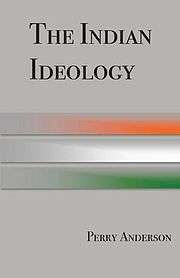The Indian Ideology
|
First edition | |
| Author | Perry Anderson |
|---|---|
| Country | India |
| Subject | Politics, history |
| Published | 2012 (Three Essays Collective) |
| Pages | vi, 184 |
| ISBN |
978-81-88789-90-0 978-81-88789-92-4 |
The Indian Ideology is a 2012 book by the British Marxist historian Perry Anderson, published by Three Essays Collective. A near-polemical critique of the modern Indian nation-building project, the book consists of three essays originally published in the London Review of Books (LRB) in July–August 2012.
In the first essay, "Independence", Anderson criticises M. K. Gandhi's role in the Indian independence movement, specifically his injection of religion into it to mobilise the masses. In "Partition", Anderson places the blame for the bloody Partition of India on the Hindu-dominated Indian National Congress, arguing that its claim to be the sole representative for all Indians led to the inevitable rise of the Muslim League and the two-nation theory. "Republic", the third and final essay, criticises independent India's first prime minister, Jawaharlal Nehru, and his legacy—a deeply unequal republic dominated by his descendants, where caste and religion remain entrenched in civic life.
Asked by Praful Bidwai in an interview to sum up The Indian Ideology, Anderson said the book "advances five main arguments that run counter to conventional wisdom in India today":
Firstly, that the idea of a subcontinental unity stretching back six thousand years is a myth. Secondly, that Gandhi’s injection of religion into the national movement was ultimately a disaster for it. Thirdly, that primary responsibility for Partition lay not with the Raj, but Congress. Fourthly, that Nehru’s legacy to Republic was far more ambiguous than his admirers will admit. Lastly, that Indian democracy is not contradicted by caste inequality, but rather enabled by it.[1]
Following the essays' original publication, the LRB received several letters of praise as well as criticism from scholars in India and abroad. When they were collected in book form as The Indian Ideology by Three Essays Collective, a small Gurgaon-based publisher of scholarly material, the work received mixed reviews in the print and digital media.
 The British Marxist historian Perry Anderson in 2008.
The British Marxist historian Perry Anderson in 2008. Jawaharlal Nehru and Mahatma Gandhi, seen here in 1942, who come in for severe criticism in The Indian Ideology.
Jawaharlal Nehru and Mahatma Gandhi, seen here in 1942, who come in for severe criticism in The Indian Ideology. For Anderson, Subhas Chandra Bose was "the only leader Congress ever produced who united Hindus, Muslims and Sikhs in a common secular struggle", whose "fearless militancy and commanding intellectual gifts had made him hugely popular in the party".
For Anderson, Subhas Chandra Bose was "the only leader Congress ever produced who united Hindus, Muslims and Sikhs in a common secular struggle", whose "fearless militancy and commanding intellectual gifts had made him hugely popular in the party".
See also
- The German Ideology, the Karl Marx work whose title inspired The Indian Ideology
The following books were criticised by Anderson for "shar[ing] with the rhetoric of the state itself ... the centrality of four tropes in the official and intellectual imaginary of India":
- The Rediscovery of India by Meghnad Desai
- India after Gandhi and Makers of Modern India by Ramachandra Guha
- The Burden of Democracy by Pratap Bhanu Mehta
- The Argumentative Indian by Amartya Sen
- The Idea of India by Sunil Khilnani
References
- ↑ Praful Bidwai. "Interview: 'Respect Gandhi If You Will, Don’t Sentimentalise Him' ". Outlook. 12 November 2012. Retrieved on 25 January 2014.
Further reading
- Yahya Chaudhry. "The Poverty of Indian Ideology". Jacobin. 5 December 2013.
- Ananya Vajpeyi. "Retrieving a History: Why the idea of India cannot be trivially dismissed". The Caravan. 1 September 2012.
- Prabhat Patnaik. "Modern India sans the Impact of Capitalism". Economic and Political Weekly. 7 September 2013.
- Mihir S. Sharma. "Why Perry Anderson is wrong". Business Standard. 1 November 2012.
- Pankaj Mishra. "India and Ideology: Why Western Thinkers Struggle With the Subcontinent". Foreign Affairs. November/December 2013.
- Maria Misra. "The Indian Ideology". Prospect. 17 October 2013.
- Praful Bidwai. "Interview: 'Respect Gandhi If You Will, Don’t Sentimentalise Him' ". Outlook. 12 November 2012.
- Vijay Prashad. "A flawed project". Frontline. 29 December 2012 – 11 January 2013.
- "12 good reads from 2012". The Hindu. 1 January 2013.
- Rajesh Sharma. "Book Review: The Indian Ideology". Countercurrents.org . 7 January, 2013.
- Dilip Simeon. "Abominable Anderson". Bargad.org. November 9, 2012.
- Antony Copley. "Contra Anderson". Gandhi Marg (quarterly journal of the Gandhi Peace Foundation). July–December 2012.
- Ravi Palat. "Book Review: The Indian Ideology". Critical Asian Studies. Volume 45, Issue 2, 2013, pp.323–330.
External links
- The Indian Ideology at Three Essays Collective
- The essays on the London Review of Books website:
- "Gandhi Centre Stage", 5 July 2012
- "Why Partition?", 19 July 2012
- "After Nehru", 2 August 2012
